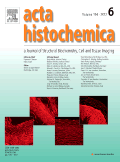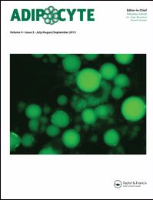
ACTA HISTOCHEMICA
Scope & Guideline
Exploring the Cellular Landscape Through Histochemical Innovation
Introduction
Aims and Scopes
- Histological Techniques and Methodologies:
The journal emphasizes innovative histological techniques, including immunohistochemistry and advanced imaging methods, to investigate cellular and tissue structures. - Cellular and Molecular Mechanisms in Disease:
Research published often explores the cellular and molecular mechanisms underlying various diseases, particularly cancer, metabolic disorders, and neurodegenerative diseases. - Stem Cell and Regenerative Medicine:
A significant focus is placed on stem cell biology, including differentiation mechanisms and therapeutic applications in regenerative medicine. - Tissue Pathology and Diagnostics:
The journal covers studies that contribute to understanding tissue pathology and the development of diagnostic markers for various diseases. - Comparative Histology:
Research often includes comparative studies across species, providing insights into evolutionary biology and the functional adaptations of tissues.
Trending and Emerging
- Cancer Biology and Therapeutics:
A marked increase in studies focusing on cancer biology, including the mechanisms of tumor progression and the development of targeted therapies, showcases the journal's alignment with pressing global health issues. - Stem Cell Research and Applications:
There is a growing trend towards exploring the therapeutic potential of stem cells, particularly in regenerative medicine, highlighting advancements in understanding their differentiation and application in various diseases. - Molecular Pathology and Biomarkers:
The rise in research focused on identifying molecular biomarkers for disease diagnosis and prognosis indicates a trend towards precision medicine and personalized treatment strategies. - Neurohistology and Neurodegeneration:
Emerging studies in neurohistology, particularly those investigating the cellular changes associated with neurodegenerative diseases, reflect an increasing awareness of brain health and pathology. - Environmental and Developmental Histopathology:
Research exploring the impacts of environmental factors on tissue development and pathology is gaining attention, emphasizing the relevance of histopathology in understanding health impacts of environmental exposures.
Declining or Waning
- Traditional Histochemistry Techniques:
There appears to be a waning emphasis on classical histochemical techniques, as newer molecular and imaging methods gain popularity and provide more specific insights into cellular processes. - Basic Morphological Studies:
Studies focusing solely on basic morphological descriptions without integrating functional or molecular insights are becoming less frequent, indicating a shift towards more comprehensive research. - Non-specific Immunohistochemical Applications:
Research that employs non-specific immunohistochemical applications without clear hypotheses or mechanistic insights is seen less frequently, as the field moves towards more targeted and hypothesis-driven studies.
Similar Journals

CELL AND TISSUE RESEARCH
Exploring the Depths of Histology and PathologyCELL AND TISSUE RESEARCH, published by Springer, is a premier journal dedicated to advancing the field of cell biology, histology, pathology, and forensic medicine. With a proud history dating back to its foundation in 1924 and continuing its legacy, this journal has established itself as a vital source for innovative research, facilitating the dissemination of significant findings that contribute to the understanding of cellular and tissue dynamics. Hailing from Germany, the journal exhibits an impressive standing in the academic community with a 2023 impact factor reflected in its category quartiles: Q2 in Cell Biology, Q1 in Histology, and Q1 in Pathology and Forensic Medicine. It ranks notably within multiple Scopus categories, including 32/208 in Pathology and Forensic Medicine and 13/62 in Histology, showcasing its high percentile rankings of 84th and 79th, respectively. Researchers, professionals, and students benefit from its extensive coverage and rigorous peer-review process that ensures the integrity and relevance of its published works, thus making it an essential resource in the scientific community. While it operates under a subscription model, its commitment to quality and impact makes it an indispensable journal for anyone engaged in cellular and tissue research.

BMC Molecular and Cell Biology
Connecting researchers through groundbreaking discoveries.BMC Molecular and Cell Biology is a forward-thinking open-access journal published by BMC, specializing in the vital fields of molecular biology and cell biology. Since its inception in 2019, the journal has carved a niche for itself, ranking in the Q3 quartile in both Cell Biology and Molecular Biology categories as of 2023. With an ISSN of N/A and an E-ISSN of 2661-8850, the journal provides a platform for groundbreaking research, high-quality reviews, and innovative methodologies. Situated in the United Kingdom, BMC Molecular and Cell Biology promotes a diverse range of studies, addressing fundamental questions in biology that resonate with both experts and new researchers alike. The journal's commitment to open access ensures that valuable findings are readily available to the global scientific community, fostering collaboration and knowledge-sharing across disciplines. Researchers aiming to contribute to the field of cell and molecular biology will find this journal an indispensable resource for both publishing and staying informed on the latest advances.

Cell Regeneration
Advancing the Frontiers of Cellular DiscoveryCell Regeneration, published by SPRINGERNATURE, stands at the forefront of biological research, focusing on the dynamic field of cellular development and regenerative biology. Since its establishment in 2012, this journal has embraced an Open Access model, facilitating widespread dissemination of key findings and fostering collaboration among researchers in the Netherlands and beyond. With an impact factor underscoring its significance, Cell Regeneration is positioned in the Q2 category in both Cell Biology and Developmental Biology as of 2023, ranked #32 out of 82 and #170 out of 285 in relevant Scopus peer fields. The journal encompasses a broad spectrum of research that advances our understanding of cellular processes, offering vital insights into regenerative mechanisms and their applications in therapies. This robust platform not only serves as a valuable resource for researchers, professionals, and students but also encourages scholarly dialogue and innovation in the fast-evolving landscape of cell biology.

Frontiers in Cell and Developmental Biology
Pioneering research for a deeper understanding of life.Frontiers in Cell and Developmental Biology is a leading open-access journal published by FRONTIERS MEDIA SA, dedicated to advancing the understanding of fundamental biological processes at the cellular and developmental levels. Since its inception in 2013, the journal has positioned itself as a cornerstone of research in its field, achieving esteemed Q1 quartile rankings in both Cell Biology and Developmental Biology for 2023. With a robust Scopus ranking of #13 out of 82 in Developmental Biology and #67 out of 285 in Cell Biology, it represents a vital platform for innovative research and scholarly discourse. The journal provides a comprehensive and accessible avenue for researchers, professionals, and students alike to share high-quality findings and insights into cellular mechanisms and developmental processes, fostering collaboration and knowledge exchange in the global scientific community. Based in Lausanne, Switzerland, Frontiers in Cell and Developmental Biology is committed to open science, ensuring that all articles are freely accessible to the public, thereby broadening the impact of research in the biological sciences.

BIOCELL
Innovative Insights into Cellular MechanismsBIOCELL is a distinguished peer-reviewed journal dedicated to the field of Cell Biology, published by TECH SCIENCE PRESS. Since its inception in 1995, the journal has been at the forefront of disseminating innovative research, with converged publication years extending from 1995 to 2013 and from 2015 to 2024. Although it currently holds a Q4 ranking in the Cell Biology category according to the 2023 category quartiles, BIOCELL aims to foster advancements by providing a platform for researchers, professionals, and students to share their findings in biochemistry, genetics, and molecular biology. The journal is available in both print (ISSN: 0327-9545) and digital formats (E-ISSN: 1667-5746) and seeks to attract contributions that enhance scholarly dialogue and understandings of cellular mechanisms and innovations. With a commitment to quality research and critical discourse, BIOCELL plays an important role in nurturing the scientific community within Argentina and beyond, offering vital insights that contribute to the advancement of the life sciences.

Cell and Bioscience
Elevating the Standards of Cellular and Bioscience InquiryCell and Bioscience is a prestigious open-access journal published by BMC that has been at the forefront of biochemistry, genetics, and molecular biology since its inception in 2011. With an impressive impact factor, this journal has established itself as a vital resource for researchers and professionals in these rapidly advancing fields, reflecting its high ranking of #29 out of 221 in the Scopus classification and placing it in the 87th percentile. Based in the United Kingdom, Cell and Bioscience aims to foster innovation and dissemination of research findings addressing critical biological questions through rigorous peer-reviewed articles and inter-disciplinary approaches. The journal's open-access model ensures unrestricted access to transformative research, promoting collaboration and knowledge sharing among academics, students, and practitioners worldwide. With a commitment to maintaining excellence in the field, Cell and Bioscience provides an essential platform for those looking to contribute to the evolving landscape of biosciences.

FOLIA HISTOCHEMICA ET CYTOBIOLOGICA
Empowering Scientists with Open Access to Cutting-edge ResearchFOLIA HISTOCHEMICA ET CYTOBIOLOGICA, an esteemed journal published by VIA MEDICA, serves as a vital platform for researchers and professionals in the fields of histology, pathology, and cytobiology. With an ISSN of 0239-8508 and E-ISSN of 1897-5631, this Open Access journal has been disseminating significant findings since 1984, offering free access to a broad audience of scientists and academics. Based in Poland, this journal focuses on critical advancements in the study of cellular structures and functions, contributing substantially to the understanding of various diseases and biological processes. The journal currently holds a respectable impact factor, ranking in the Q3 category for Histology and miscellaneous Medicine, and Q2 for Pathology and Forensic Medicine as per the 2023 metrics. With its commitment to quality research and an inclusive publishing approach, FOLIA HISTOCHEMICA ET CYTOBIOLOGICA is poised to continue influencing its fields significantly through 2024 and beyond.

Adipocyte
Leading the Way in Adipose Tissue StudiesAdipocyte is a distinguished academic journal published by Taylor & Francis Inc., focusing on groundbreaking research within the realms of cell biology and histology. With an impact factor that reflects its importance, the journal has achieved a Q2 ranking in Cell Biology and a prestigious Q1 ranking in Histology for 2023, cementing its reputation as a leading resource for scientists and researchers in these fields. Since transitioning to Open Access in 2019, Adipocyte has fostered a wider dissemination of knowledge, enabling unrestricted access to a wealth of studies and reviews critical for advancing the understanding of adipose tissue biology. Located in the United Kingdom, with converged years spanning from 2013 to 2024, the journal serves as an essential platform for the exchange of innovative ideas and findings, supporting the academic community's efforts to unravel the complexities related to fat cells and their implications in health and disease.

CYTOTECHNOLOGY
Elevating Science: Bridging Concepts and Applications in Cytotechnology.CYTOTECHNOLOGY, an esteemed journal published by Springer, stands as a vital resource in the fields of Bioengineering, Biomedical Engineering, and Biotechnology. With an impact factor reflective of its solid position within academia, this journal encompasses a broad scope dedicated to the advancement of cytotechnological research and applications from its inception in 1987 through to its latest volumes in 2024. Based in the Netherlands, it is committed to providing researchers, professionals, and students with high-quality, peer-reviewed articles that contribute to the understanding and innovations in cytotechnology. Although currently not open access, CYTOTECHNOLOGY has garnered a commendable reputation, holding Q3 rankings in multiple categories, indicating its relevance and influence within the scientific community. Researchers are encouraged to submit their cutting-edge findings to share insights that can spark further advancements in this dynamic field.

HISTOCHEMISTRY AND CELL BIOLOGY
Fostering Innovation in Histochemical ResearchHISTOCHEMISTRY AND CELL BIOLOGY, published by SPRINGER, is a prominent journal dedicated to advancing the fields of histochemistry and cell biology. With an ISSN of 0948-6143 and an E-ISSN of 1432-119X, this journal has carved a significant niche since its inception in 1995, striving for excellence in research dissemination through a rigorous peer-review process. The journal's impact is reflected in its strong performance across various academic categories, achieving a Q1 ranking in Medical Laboratory Technology, Q2 in Histology, and maintaining a credible presence in Cell and Molecular Biology. Nestled in Germany, and with the backing of a reputable publisher, HISTOCHEMISTRY AND CELL BIOLOGY serves as a pivotal platform for researchers, professionals, and students, fostering innovations that push the boundaries of our understanding of cellular processes. While the journal is not open access, it offers subscription-based access options ensuring comprehensive coverage of crucial findings in the rapidly evolving arena of cell biology and histochemistry.